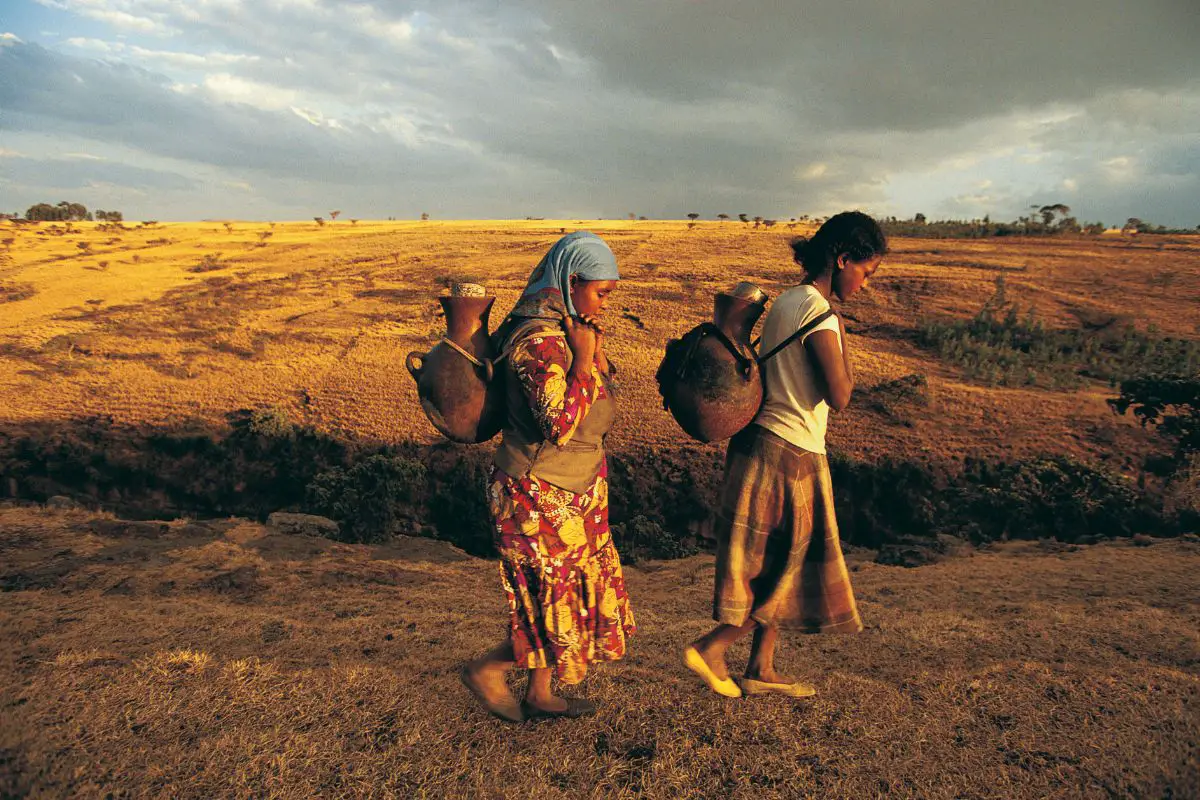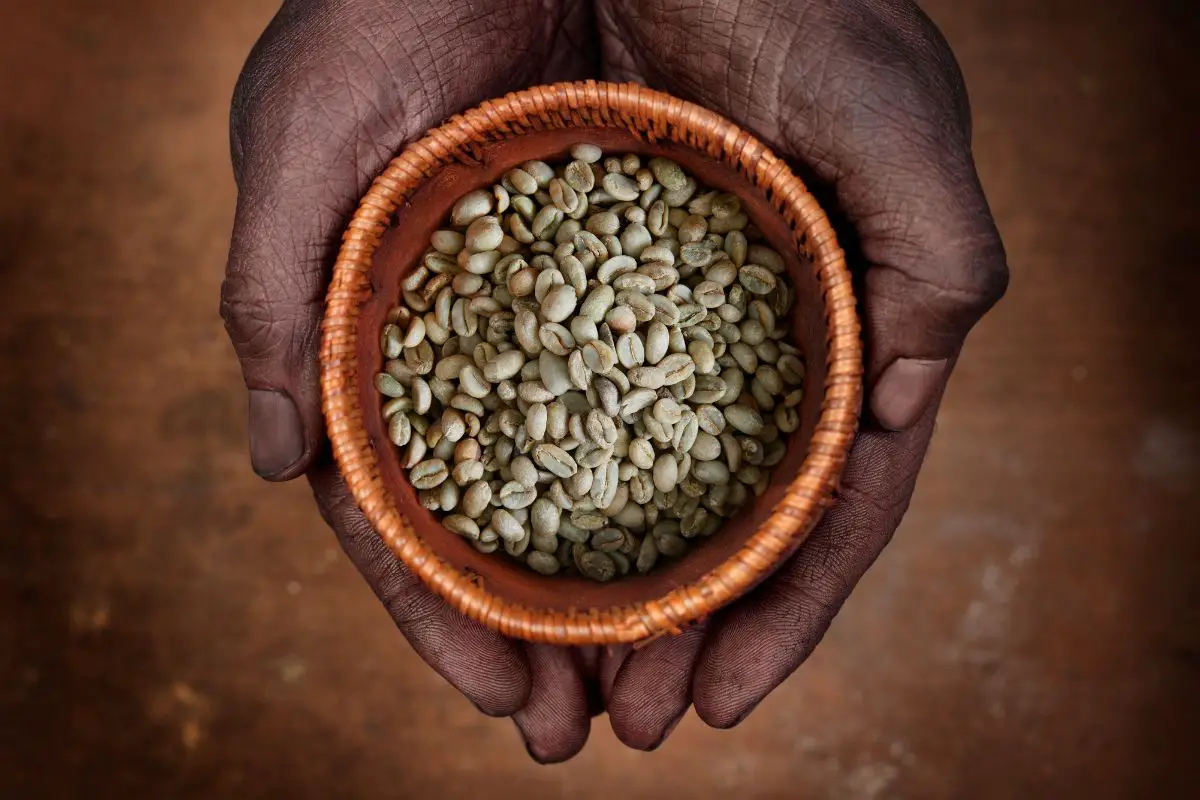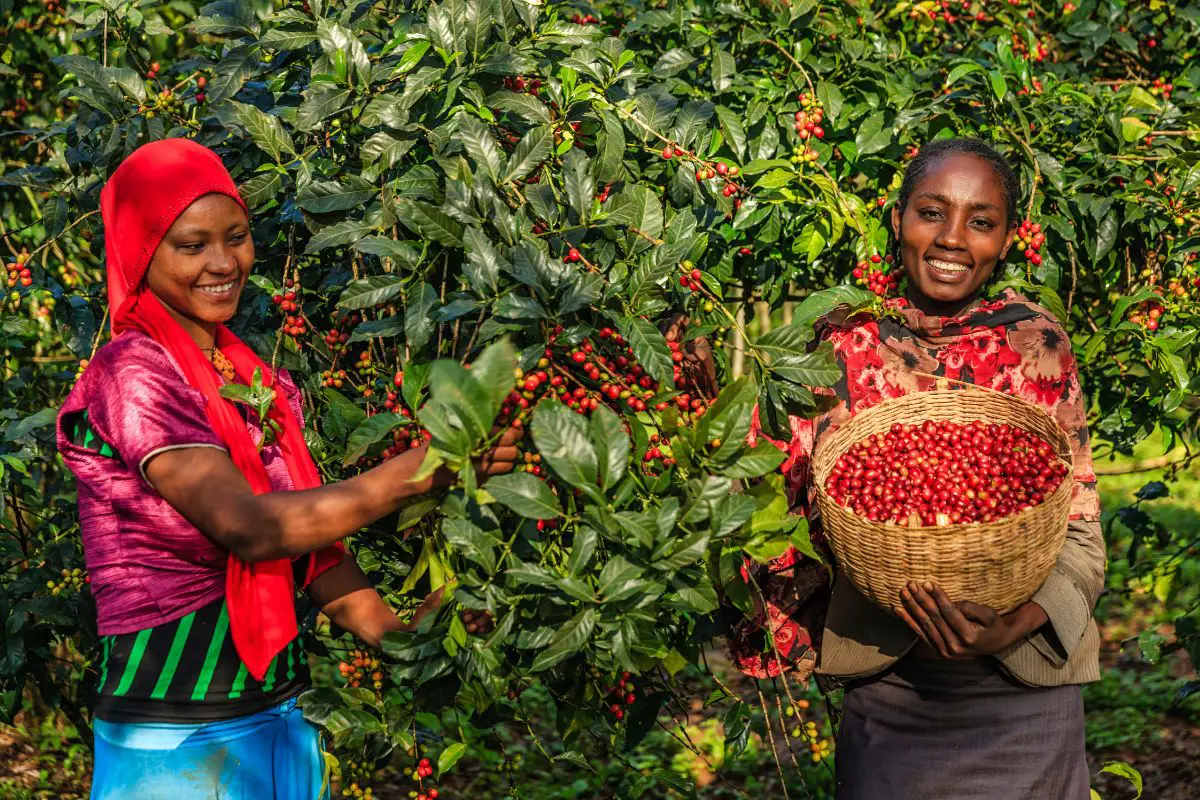In this article, readers will embark on a comprehensive exploration of the rich history and cultural significance of coffee in Ethiopia, the birthplace of the beloved beverage. Delve into the captivating origin story of coffee and discover its role in shaping Ethiopian society, art, and the economy. Learn about the fascinating Ethiopian Coffee Ceremony, an essential part of their culture, and find out how coffee has influenced various aspects of Ethiopian art, music, and literature. Familiarize yourself with the diverse coffee-producing regions and distinct flavors of Ethiopian coffee varieties while recognizing the sustainable practices that have been long implemented in Ethiopian coffee farming. Finally, understand how coffee has contributed in forging a unique Ethiopian identity and the global appreciation for Ethiopian coffee in the international specialty coffee industry.

Historical Significance of Coffee in Ethiopia
Origin and discovery of coffee in Ethiopia
Coffee is an essential part of Ethiopian culture and history, with its origins dating back to the 9th century. Legend has it that an Ethiopian goat herder named Kaldi observed his goats getting energized after consuming berries from a specific plant. This intrigued Kaldi, who tried the berries himself and experienced a similar jolt of energy. He then took these berries to a local monastery, where the monks used them to stay awake during their nightly prayers.
The plant producing these magical berries is the Coffea arabica, originating in the forests of the southwestern highlands of Ethiopia. The practice of consuming coffee started in these regions and slowly spread to other parts of the country, eventually making its way to other parts of the world such as Arabia, Europe, and the Americas. Ethiopian coffee was first traded with Arab merchants, who then introduced it to the Arabian Peninsula, which led to the growth of the global coffee industry. Today, Ethiopia is the largest coffee producer in Africa and the 5th largest in the world.
Role of coffee in Ethiopian society and economy
Coffee plays a crucial role in Ethiopian society and economy, being an important social and cultural aspect of daily life. Coffee is often consumed during social gatherings or government meetings and is seen as a symbol of hospitality and friendship. In rural areas, coffee cultivation is a primary source of income for many households, contributing significantly to the country’s overall economy.
As the birthplace of coffee, Ethiopia possesses unique coffee varieties characterized by distinctive flavors, aromas, and acidity levels. Coffee production is the backbone of Ethiopia’s agricultural sector, accounting for approximately 60% of the country’s total export revenue. An estimated 15 million people, nearly one-fifth of the population, depend on coffee production, processing, and trading for their livelihoods.
Moreover, Ethiopia has a well-established coffee tourism industry, attracting visitors from around the world to experience its rich coffee culture, taste its unique coffee, and learn about various coffee production methods and traditions. This further contributes to the Ethiopian economy and global recognition of Ethiopia as the origin of coffee.
The Ethiopian Orthodox Church and coffee
The Ethiopian Orthodox Church, the predominant religion in the country, also plays a significant role in coffee history and tradition. From its initial days, coffee has had religious connotations, as the monks from the Ethiopian Orthodox Church consumed coffee to stay alert during their prayers. Furthermore, even today, coffee is considered as an essential part of religious ceremonies and celebrations.
Coffee, being central to Ethiopian culture, is also part of the Orthodox Church’s unique traditions. The Ethiopian Orthodox Church has special religious events called “coffee festivals” where congregants gather to pray, socialize, and enjoy coffee together. This further highlights the deep-rooted connection between coffee and the Ethiopian Orthodox Church.
Ethiopian Coffee Ceremony
Preparation and steps involved in the ceremony
The Ethiopian coffee ceremony is a unique and traditional custom that showcases the rich historical significance and cultural importance of coffee in Ethiopian society. The ceremony is characterized by several specific steps that entail roasting coffee beans on a small stove, crushing the beans using a mortar and pestle, and then brewing the coffee in a traditional clay pot called a “jebena.”
The process begins by spreading out fresh green coffee beans on a flat pan and roasting them over a small charcoal stove. The beans are roasted until they turn dark brown and emit a strong aroma. The roasted beans are then crushed in a wooden mortar and pestle, grinding them into a fine powder. This coffee powder is placed into the jebena, and boiling water is poured over it. The coffee is then allowed to steep for a few minutes before it is poured into small cups called “cini.”
Symbolism and meaning behind the ceremony
The Ethiopian coffee ceremony holds deep cultural and symbolic significance. It serves as a means of promoting social bonds, enhancing friendships, and demonstrating hospitality. Participation in the coffee ceremony is considered an honor, and it reflects the Ethiopian people’s commitment to maintaining their cultural heritage.
The coffee ceremony also symbolizes unity, as it brings people together to share stories, news, and build connections within the community. It is a time for people to pause from their daily routines and focus on creating meaningful relationships. The aroma of brewing coffee signifies warmth and invites friends, family, and neighbors to join in the ceremony.
Occasions and gatherings for the coffee ceremony
The Ethiopian coffee ceremony takes place in various settings and occasions, ranging from informal social gatherings to religious festivals and special events such as weddings, funerals, or important community discussions. The coffee ceremony remains an integral part of Ethiopian life and continues to be a shared experience that strengthens social ties and values.
In urban areas, the coffee ceremony is sometimes conducted inside specially designed coffee houses called “bunna bet,” where friends and family can gather and enjoy coffee in a traditional manner. The Ethiopian coffee ceremony is a unique and fascinating cultural practice that highlights the importance of coffee in Ethiopian history and everyday life, and showcases Ethiopia’s rich traditions and customs.
Coffee in Ethiopian Art, Music, and Literature
Ethiopia, the birthplace of coffee, holds a significant cultural, social, and economic relationship with this beloved beverage. Throughout the centuries, Ethiopian art, music, and literature have been heavily influenced by coffee, shaping the nation’s cultural identity. This article will explore the presence and impact of coffee in various forms of Ethiopian art, including visual arts, music, dance, folktales, and literature.
Depictions of coffee in Ethiopian visual arts
Coffee is a central theme across various branches of Ethiopian visual arts, including painting, sculpture, and handicrafts. Its depiction often reflects the deep connection Ethiopian people have with their coffee-drinking culture and serves as a symbol of unity, heritage, and identity.
Traditional Ethiopian paintings, often found in religious manuscripts and churches, have illustrated the story of Kaldi, a goat herder who first discovered the coffee plant’s stimulating effects. The tale of Kaldi and his dancing goats has been a popular subject among Ethiopian artisans and symbolizes the inception of coffee culture.
In contemporary Ethiopian art, coffee plays an essential role in conveying social narratives and historical events. Coffee ceremonies, where beans are roasted, brewed, and served in a ceremonial manner, have been a common subject in this medium. These scenes are often depicted with vibrant colors and intricate details, showing the communal aspect and the ritualistic importance of coffee in daily life.
Likewise, Ethiopian artisans working in wood carving and pottery frequently integrate coffee-related elements into their creations. Hand-carved wooden stamps, used for traditional coffee cup readings, often have intricate designs portraying various subjects, including coffee beans, plants, and cups. Ceremonial coffee pots, known as “jebenas,” and coffee cups, called “cinnis,” showcase the tradition by incorporating diverse patterns and colors that vary across ethnic groups and locales.
Influence of coffee on Ethiopian music and dance
Coffee’s influence extends beyond visual art and permeates Ethiopian music and dance. Coffee ceremonies are often accompanied by traditional music, which celebrates the regional histories and customs.
Eskista, a traditional Ethiopian dance, holds strong ties with coffee culture. This dance, characterized by rapid shoulder movements, is believed to have originated from the legend of Kaldi and his dancing goats. Eskista is performed at social and religious gatherings, often accompanied by traditional Ethiopian coffee ceremonies, creating a celebratory atmosphere.
Musical instruments of Ethiopia, such as the masinko (a one-stringed violin) and the krar (a six-stringed lyre), are typically played during these functions, accompanying the ceremony and the lively conversations. The melodies often showcase the blending of indigenous sounds and Arab, African, and European influences, which reflects the diverse socio-cultural contexts of the coffee-drinking tradition.
Role of coffee in Ethiopian folktales and literature

Coffee’s presence in Ethiopian culture is also evident in its folktales and literature. The legend of Kaldi, an iconic narrative that has shaped the global perception of Ethiopian coffee culture, is passed down through generations via storytelling and songs.
Additionally, coffee often plays a central role in Ethiopian oral and written literature. In Amharic and Tigrinya proverbs, coffee is employed to depict communication, friendship, and community ties. Ethiopian authors also use coffee ceremonies as background settings or essential plot elements, further illustrating the impact of coffee on Ethiopian literary tradition.
In contemporary works, authors use coffee and its related rituals to explore themes such as migration, identity, and cultural preservation among the Ethiopian diaspora. In this context, literature often depicts coffee not only as an essential aspect of the Ethiopian way of life but also as a symbol of resilience and adaptability, contributing to the evolving cultural landscape of Ethiopia.
Overall, the deep-rooted connection between coffee and Ethiopian art, music, and literature showcases the remarkable role this beverage plays in shaping the nation’s identity, both historically and today. Coffee’s influence on these artistic forms conveys the lasting pride Ethiopians have in their heritage and the important bonds the community shares through their love of coffee.
Ethiopian Coffee Varieties and Production
Ethiopia is widely regarded as the birthplace of coffee, and the country’s rich history in coffee production makes it one of the most sought-after origins for specialty coffee beans. There are various distinct varieties of Ethiopian coffee, each with unique flavor profiles, that are grown in different regions of the country. Ethiopian coffee is also known for its sustainable and traditional farming practices, which contribute to the high quality of the beans.
Major coffee-producing regions in Ethiopia
There are several coffee-producing regions in Ethiopia, each with different climatic conditions, altitudes, and soil types that contribute to the unique characteristics of their respective coffee varieties. Some of the major coffee-growing regions include:
- Sidama: Located in southern Ethiopia, Sidama is one of the most famous coffee-producing regions in the country. The region has a high altitude ranging from 1,500 to 2,200 meters above sea level, which contributes to the exceptional quality of its coffee beans. Sidama coffees are known for their bright acidity, medium body, and flavors of citrus and red berries.
- Yirgacheffe: Situated within the larger Sidama region, Yirgacheffe is another well-known coffee-producing area in Ethiopia. Yirgacheffe coffee is renowned for its floral and fruity flavors, with hints of jasmine, bergamot, and peach. The coffee beans are grown at high elevations, typically between 1,700 and 2,200 meters above sea level.
- Harrar: Located in eastern Ethiopia, Harrar is a historic coffee-producing region. Harrar coffees are grown at elevations between 1,400 and 2,100 meters above sea level. These coffees are known for their strong, wine-like flavors, with notes of dark fruit, chocolate, and spice.
- Jimma: Jimma is located in southwestern Ethiopia and is home to a range of coffee varieties. The region’s beans are typically grown between 1,400 and 1,800 meters above sea level. Jimma coffees are known for their earthy, herbal flavors and lower acidity compared to other Ethiopian varieties.
Characteristics and flavors of Ethiopian coffee varieties
Ethiopian coffee varieties offer a diverse range of flavor profiles and characteristics, including:
- Heirloom varieties: Ethiopian coffee is predominantly made up of heirloom varieties, which are indigenous coffee plants that have been passed down for generations. These varieties are prized for their unique and complex flavors, such as floral notes, fruity sweetness, and bright acidity.
- Natural and washed processing methods: Ethiopian coffee beans are typically processed using either the natural or washed method. Natural-processed coffees tend to have more intense fruit flavors and a heavier body, while washed-processed beans are known for their bright acidity, floral notes, and cleaner taste.
- Acidity and body: Ethiopian coffees are known for their bright acidity, which contributes to thebeans’ distinctive flavors. The body of Ethiopian coffee can range from light to medium, depending on the region and processing method.
- Distinctive flavors: Depending on the region and processing method, Ethiopian coffees can exhibit a wide range of flavors, including fruity, floral, wine-like, and earthy notes. Some common flavors found in Ethiopian coffee varieties are citrus, red berries, jasmine, bergamot, peach, dark fruit, chocolate, and spice.
Sustainable and traditional coffee farming practices
Ethiopian coffee farmers follow sustainable and traditional farming practices that contribute to the high quality and unique flavor profiles of their beans:
- Agroforestry systems: Ethiopian coffee is typically grown using agroforestry systems, where coffee plants are grown under the shade of native trees. This practice promotes biodiversity, reduces the need for chemical inputs, and preserves natural ecosystems.
- Organic farming practices: Many Ethiopian coffee farms use organic farming practices, either by choice or due to the lack of access to synthetic fertilizers and pesticides. This leads to healthier soil, improved water quality, and a reduced impact on the environment.
- Small-scale farming: Most Ethiopian coffee is produced by small-scale farmers who cultivate small plots of land. This allows the farmers to maintain traditional farming practices and enables them to give care and attention to each coffee plant, resulting in higher-quality beans.
Ethiopia’s rich history in coffee production, diverse range of coffee varieties with unique flavors, and commitment to sustainable and traditional farming practices make Ethiopian coffee highly sought-after across the globe. Next time you enjoy a cup of Ethiopian coffee, appreciate its journey from the birthplace of coffee to your cup.
Coffee’s Impact on Ethiopian Identity and Global Influence

Ethiopia is widely recognized as the birthplace of coffee, with a deep cultural, historical, and economic connection to the beloved drink. Coffee has played an essential role in the evolution of Ethiopian identity and global influence, shaping the way people around the world enjoy and appreciate the beverage. This article will discuss how coffee has become a unifying cultural element in Ethiopia, how Ethiopian coffee has gained global recognition and appreciation, and the role Ethiopian coffee plays in the international specialty coffee industry.
Coffee as a unifying cultural element in Ethiopia
In Ethiopia, coffee is much more than just a drink; it is an indispensable part of the country’s cultural fabric. The Ethiopian coffee ceremony, which is performed several times per day, is a time-honored tradition that brings people together to socialize, discuss, and bond over steaming cups of freshly brewed coffee. At the heart of the ceremony is the skilled art of preparing coffee, which involves roasting coffee beans over an open flame, grinding them using a mortar and pestle, and brewing the coffee in a clay pot called a jebena.
Different ethnic groups throughout Ethiopia have their own distinctive coffee ceremonies, reflecting the country’s diverse cultures and traditions. However, despite these differences, the coffee ceremony serves as a bridge between communities, a shared ritual that creates a sense of unity and national pride. As Ethiopians gather around the coffee pot, they participate in a centuries-old custom that is central to their cultural identity.
In addition to its social and cultural importance, coffee is also the backbone of the Ethiopian economy. The coffee sector is crucial for the livelihoods of millions of Ethiopians, both in rural areas where coffee is grown and in urban centers where it is processed and consumed. As a major contributor to the nation’s GDP and exports, coffee helps to define Ethiopia’s economic identity as a nation heavily invested in agriculture and global trade.
Global recognition and appreciation of Ethiopian coffee
Ethiopian coffee is treasured by coffee lovers all around the world for its unique flavors, rich aroma, and diverse range of bean varieties. Ethiopia is home to several distinct coffee-growing regions, each with its own unique characteristics, resulting in a wide array of coffee profiles. From the fruity and floral flavors of Yirgacheffe to the intense, wine-like notes of Sidamo, Ethiopian coffee offers something for every palate.
Global appreciation of Ethiopian coffee can be attributed to the country’s rich coffee history, which dates back over a thousand years. According to legend, an Ethiopian goatherd named Kaldi first discovered the stimulating effects of coffee after observing his goats becoming unusually energetic after consuming the berries from a coffee tree. Since then, the story of Ethiopian coffee has spread across the globe, inspiring curiosity and admiration from coffee enthusiasts everywhere.
The sustainability and ethical practices associated with Ethiopian coffee production have also contributed to its worldwide allure. As the birthplace of coffee, Ethiopia remains one of the few countries where coffee is predominantly grown under a traditional agroforestry system, promoting biodiversity and ecological balance. These practices, as well as efforts to support fair wages and working conditions for producers, have garnered global respect and attracted an increasing number of conscientious consumers.
Ethiopian coffee’s role in the international specialty coffee industry

The international specialty coffee industry has experienced tremendous growth in recent years, driven by a growing interest in coffee’s origins, production methods, and flavor profiles. Ethiopian coffee has emerged as a key player in this expanding market, known for its exceptional quality, distinct flavors, and sustainable production practices.
Specialty coffee roasters and consumers alike celebrate Ethiopian coffee for its complexity, often showcasing single-origin beans from the various coffee-growing regions of the country. The boom in third wave coffee culture, which emphasizes traceability and a deeper connection between growers and consumers, has further increased demand for Ethiopian coffee, allowing small-scale farmers to access new markets and benefit from the burgeoning specialty coffee scene.
As a leading force in the specialty coffee sector, Ethiopian coffee has also become an important source of inspiration and innovation for the global coffee industry. Its diversity of flavors, traditional brewing methods, and commitment to sustainability serve as a model for other coffee-producing nations and highlight the potential for coffee to foster positive change and cultural exchange on a global scale.
FAQs on The Importance of Coffee in Ethiopian Cultural Traditions
1. How does coffee play a significant role in Ethiopian cultural traditions?
Coffee, originating in Ethiopia, holds significant importance in the country’s day-to-day life and social gatherings. As a symbol of hospitality, Ethiopians engage in a traditional coffee ceremony that serves coffee, snacks, and meaningful conversations among family and friends.
2. What does a traditional Ethiopian coffee ceremony entail?
The Ethiopian coffee ceremony begins with roasting green coffee beans over a small charcoal stove. The roasted beans are then ground using a mortar and pestle, followed by brewing the coffee in a clay pot called a jebena. The coffee is served with incense and accompanied by snacks.
3. How often are coffee ceremonies performed in Ethiopian households?
Ethiopian coffee ceremonies are regular occurrences in households, often performed multiple times a day. They play an essential role in social interactions and serve as a forum for exchanging news, ideas, and experiences among family members and guests.
4. How do coffee ceremonies serve as a symbol of community and hospitality in Ethiopian culture?
Coffee ceremonies act as a platform for sharing conversations and spending time with friends, neighbors, or newcomers in the community. Hosting or attending a coffee ceremony showcases respect, friendship, and a willingness to engage in social interactions with others.
5. Are there specific protocols and etiquette when attending or hosting an Ethiopian coffee ceremony?
Guests should gratefully accept the first cup of coffee offered by the host as a sign of respect. Use the traditional handleless cups called “cini” in a two-handed manner. Complimenting the coffee and thanking the host are also appreciated gestures.
6. Has globalization impacted the cultural significance of coffee and coffee ceremonies in Ethiopia?
Although globalization has introduced Western-style coffee shops, the traditional coffee ceremony remains deeply ingrained in Ethiopian culture. The reverence for the ritual persists, fostering community connections and maintaining Ethiopian heritage across generations.
Related Article:
The Significance of the Coffee Ceremony in Ethiopian Culture